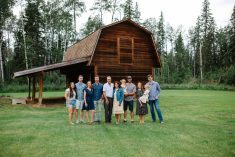Transferring the farm to the next generation is a complicated affair that involves finances, tax implications, legal strategies and good communication among all those affected. With all those balls in the air, the one element that Mom and Dad often think about, but somehow don’t actually get serious about, is whether the next generation is ready to take the helm.
They might not even realize that the kids are wondering about it too, and are equally unsure how to figure out what they need to know, and what skills they will need as well.
Read Also

Farm & Family – Feb 27 edition
Last week, we highlighted part one of a two-part series by GFM associate digital editor Geralyn Wichers about why you…
Farming is an increasingly complex business in an increasingly complex industry, says Mark Ferguson, a business management specialist with the Ontario ag ministry in Guelph.
His message to farms in process of succession always includes a key caution: “You have to ask yourself,” Ferguson says, “Does the next generation have the necessary skills, knowledge and capacity?”
That word “capacity” is a tough one. In fact, it’s the kind of word that sometimes makes you want to not think about it at all. Do your kids have what it takes?
Even before assessing the next generation’s preparedness, Michael Bossy, an accountant and business coach in Tillsonburg, Ont., says it’s essential to check their motivation.
“Why is the son or daughter interested? Is it because they failed elsewhere and the farm is a safe haven, or because it’s Dad’s dream for the next generation to take over?”
Those aren’t the best reasons, emphasizes Bossy. “You need to have a passion for farming.”
You also need to ensure there’s a fit between the generations when it comes to their core values, continues Bossy. Our core values highlight what we stand for and guide our behaviours, decisions and action. If the successor’s values aren’t in alignment with the senior generation it will be like “forcing a square peg into a round hole,” he warns.
Self-knowledge is another important element, says Bossy. “What do you like to do? It can be advantageous to figure this out early,” says Bossy, who uses the Kolbe cognitive assessment with his clients to provide insight into each individual’s natural tendencies and to reduce tension between team members.
Before the next generation starts thinking seriously about taking over the farm, it’s a good idea to set some rules around what needs to be in place, says Bossy. For example, some farmers insist their sons and daughters get a college or university degree and work off-farm for a minimum of three years before they can come back to work on the farm.
If you do though, it’s essential to be clear about it. Expectations around education and the acquisition of outside experience by the incoming generation should be clearly identified and accepted by each individual involved in advance.
If both generations will be working on the farm together, it’s also important to determine the economic viability of the farm and whether the farm generates sufficient income to support additional family members, says Glenn Dogterom, a Lethbridge, Alta. accountant with 40 years’ experience working in farm transition planning.
Critical HR skills
To identify gaps in the potential successor’s skills and abilities, Ferguson suggests creating a list of the knowledge required for each activity needed to run the farm and compare it to the successor’s current skill set. The next step is to develop a plan for how the successor will fill those gaps, he continues.
In that discussion, set aside some time and some head space to think specifically about HR skills.
It’s critical that the skills profile includes both production and management skills such as leadership, human resources and finances, says Ferguson. Too often the focus on tech or production skills overshadows the importance of developing management skills, especially HR skills.
Bossy agrees. “Farmers and their children tend to be good on the operational side of the business but tend to fall down when it comes to HR issues.” Many farmers lament “Why can’t I find good people?” he says. “They should turn it around: Why would good people want to work for you?” This, he explains, is where HR and management can make the difference.
Knowing how to run a meeting is another skill that’s easy to overlook, especially because it might be under-developed in both the junior and senior generations. Yet knowing how to run truly effective meetings is bound to become more important over the years, says Bossy.
Bossy suggests choosing five things to work on in the next three-month period while emphasizing the importance of focusing on progress, not perfection.
The plan should also include a budget to cover the costs of training and development.
There are many ways for the successor to build on their skill set including coaching, conferences, courses, job shadowing and mentoring.
When it comes to mentoring, a non-family member may be a better choice, says Ferguson.
When choosing which meetings and conferences to attend, look for ones with a management focus and, if possible, have both junior and senior generations attend, says Bossy.
To help the succeeding generation gain experience, Bossy advises considering areas of the farm operation where you could allow your son or daughter to have authority, responsibility and accountability. Include an approximate date when responsibility will be transferred and the successor generation will be held accountable and evaluated, he advises.
If the successor lacks experience with capital purchases, for example, the pathway to learning may involve negotiating smaller purchases such as farm inputs as a step towards larger capital purchases, says Ferguson.
This underscores the importance of job descriptions to create a clear division of labour, management, roles and responsibilities when two generations are working together, cautions Bossy.
Dogterom gives an additional reason for ensuring job descriptions are in place during the transition phase. If the incoming generation is only doing work equivalent to the hired labour then that’s the rate of compensation that should be paid, he says. On the other hand, if the successor is taking on a management role around cropping decisions, for example, then there is added value that should be compensated.
It’s also important to remember that the successor development plan is dynamic and should be reviewed continuously, says Ferguson. “What’s worked and what hasn’t? There should be two-way communication.”
Methods for training the successor
Adapted from the Canadian Agricultural Human Resources Council Agri HR Toolkit
Preparing your successor for their role is a key component of succession planning. A significant amount of training and development is often required before your successor is ready to take on their new role, so those development activities need to be part of your succession plan.
Below are some of the methods you can use to help develop your successor:
- Coaching: A series of interactions with a coach (typically recruited from outside the operation) to provide successors with the tools and opportunities needed to develop knowledge, skills and abilities.
- Conferences: Attendance at conferences and seminars to keep up with evolving knowledge.
- Formal course work: Formal training programs include workshops and academic programs delivered in person or online.
- Job rotation: Movement through several positions over a period of time to broaden skills.
- Job shadowing: Observing another worker performing job tasks.
- Job swapping: Cross-training to learn multiple job skills and have a better understanding of exactly what it takes to run the farm business.
- Mentoring: A process in which a more senior person provides guidance, advice and assistance to develop a more junior colleague.
- Role modelling: Observing a role model who performs tasks well.
- Self-study: Reading to increase knowledge.
Resources
OMAFRA Farm Succession Planning Steps and Checklist
Farm Management Canada, 60 Questions to Prepare the Succession of Your Farm Business
This article was originally published as “Pass the test” in the March 3, 2020 issue of Country Guide.
















